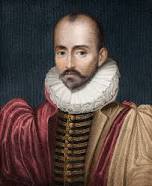Essays of Michel de Montaigne Page #27
The Essays of Michel de Montaigne are contained in three books and 107 chapters of varying length. They were originally written in Middle French and were originally published in the Kingdom of France.
Secondly, that, by this means, I the less remember the injuries I have received; insomuch that, as the ancient said,--[Cicero, Pro Ligar. c. 12.]--I should have a register of injuries, or a prompter, as Darius, who, that he might not forget the offence he had received from those of Athens, so oft as he sat down to dinner, ordered one of his pages three times to repeat in his ear, “Sir, remember the Athenians”;--[Herod., v. 105.]--and then, again, the places which I revisit, and the books I read over again, still smile upon me with a fresh novelty. It is not without good reason said “that he who has not a good memory should never take upon him the trade of lying.” I know very well that the grammarians--[Nigidius, Aulus Gellius, xi. ii; Nonius, v. 80.]-- distinguish betwixt an untruth and a lie, and say that to tell an untruth is to tell a thing that is false, but that we ourselves believe to be true; and that the definition of the word to lie in Latin, from which our French is taken, is to tell a thing which we know in our conscience to be untrue; and it is of this last sort of liars only that I now speak. Now, these do either wholly contrive and invent the untruths they utter, or so alter and disguise a true story that it ends in a lie. When they disguise and often alter the same story, according to their own fancy, ‘tis very hard for them, at one time or another, to escape being trapped, by reason that the real truth of the thing, having first taken possession of the memory, and being there lodged impressed by the medium of knowledge and science, it will be difficult that it should not represent itself to the imagination, and shoulder out falsehood, which cannot there have so sure and settled footing as the other; and the circumstances of the first true knowledge evermore running in their minds, will be apt to make them forget those that are illegitimate, and only, forged by their own fancy. In what they, wholly invent, forasmuch as there is no contrary impression to jostle their invention there seems to be less danger of tripping; and yet even this by reason it is a vain body and without any hold, is very apt to escape the memory, if it be not well assured. Of which I had very pleasant experience, at the expense of such as profess only to form and accommodate their speech to the affair they have in hand, or to humour of the great folks to whom they are speaking; for the circumstances to which these men stick not to enslave their faith and conscience being subject to several changes, their language must vary accordingly: whence it happens that of the same thing they tell one man that it is this, and another that it is that, giving it several colours; which men, if they once come to confer notes, and find out the cheat, what becomes of this fine art? To which may be added, that they must of necessity very often ridiculously trap themselves; for what memory can be sufficient to retain so many different shapes as they have forged upon one and the same subject? I have known many in my time very ambitious of the repute of this fine wit; but they do not see that if they have the reputation of it, the effect can no longer be. In plain truth, lying is an accursed vice. We are not men, nor have other tie upon one another, but by our word. If we did but discover the horror and gravity of it, we should pursue it with fire and sword, and more justly than other crimes. I see that parents commonly, and with indiscretion enough, correct their children for little innocent faults, and torment them for wanton tricks, that have neither impression nor consequence; whereas, in my opinion, lying only, and, which is of something a lower form, obstinacy, are the faults which are to be severely whipped out of them, both in their infancy and in their progress, otherwise they grow up and increase with them; and after a tongue has once got the knack of lying, ‘tis not to be imagined how impossible it is to reclaim it whence it comes to pass that we see some, who are otherwise very honest men, so subject and enslaved to this vice. I have an honest lad to my tailor, whom I never knew guilty of one truth, no, not when it had been to his advantage. If falsehood had, like truth, but one face only, we should be upon better terms; for we should then take for certain the contrary to what the liar says: but the reverse of truth has a hundred thousand forms, and a field indefinite, without bound or limit. The Pythagoreans make good to be certain and finite, and evil, infinite and uncertain. There are a thousand ways to miss the white, there is only one to hit it. For my own part, I have this vice in so great horror, that I am not sure I could prevail with my conscience to secure myself from the most manifest and extreme danger by an impudent and solemn lie. An ancient father says “that a dog we know is better company than a man whose language we do not understand.” “Ut externus alieno pene non sit hominis vice.” [“As a foreigner cannot be said to supply us the place of a man.” --Pliny, Nat. Hist. vii. I] And how much less sociable is false speaking than silence? King Francis I. vaunted that he had by this means nonplussed Francesco Taverna, ambassador of Francesco Sforza, Duke of Milan, a man very famous for his science in talking in those days. This gentleman had been sent to excuse his master to his Majesty about a thing of very great consequence, which was this: the King, still to maintain some intelligence with Italy, out of which he had lately been driven, and particularly with the duchy of Milan, had thought it convenient to have a gentleman on his behalf to be with that Duke: an ambassador in effect, but in outward appearance a private person who pretended to reside there upon his own particular affairs; for the Duke, much more depending upon the Emperor, especially at a time when he was in a treaty of marriage with his niece, daughter to the King of Denmark, who is now dowager of Lorraine, could not manifest any practice and conference with us without his great interest. For this commission one Merveille, a Milanese gentleman, and an equerry to the King, being thought very fit, was accordingly despatched thither with private credentials, and instructions as ambassador, and with other letters of recommendation to the Duke about his own private concerns, the better to mask and colour the business; and was so long in that court, that the Emperor at last had some inkling of his real employment there; which was the occasion of what followed after, as we suppose; which was, that under pretence of some murder, his trial was in two days despatched, and his head in the night struck off in prison. Messire Francesco being come, and prepared with a long counterfeit history of the affair (for the King had applied himself to all the princes of Christendom, as well as to the Duke himself, to demand satisfaction), had his audience at the morning council; where, after he had for the support of his cause laid open several plausible justifications of the fact, that his master had never looked upon this Merveille for other than a private gentleman and his own subject, who was there only in order to his own business, neither had he ever lived under any other aspect; absolutely disowning that he had ever heard he was one of the King’s household or that his Majesty so much as knew him, so far was he from taking him for an ambassador: the King, in his turn, pressing him with several objections and demands, and challenging him on all sides, tripped him up at last by asking, why, then, the execution was performed by night, and as it were by stealth? At which the poor confounded ambassador, the more handsomely to disengage himself, made answer, that the Duke would have been very loth, out of respect to his Majesty, that such an execution should have been performed by day. Any one may guess if he was not well rated when he came home, for having so grossly tripped in the presence of a prince of so delicate a nostril as King Francis.
Translation
Translate and read this book in other languages:
Select another language:
- - Select -
- 简体中文 (Chinese - Simplified)
- 繁體中文 (Chinese - Traditional)
- Español (Spanish)
- Esperanto (Esperanto)
- 日本語 (Japanese)
- Português (Portuguese)
- Deutsch (German)
- العربية (Arabic)
- Français (French)
- Русский (Russian)
- ಕನ್ನಡ (Kannada)
- 한국어 (Korean)
- עברית (Hebrew)
- Gaeilge (Irish)
- Українська (Ukrainian)
- اردو (Urdu)
- Magyar (Hungarian)
- मानक हिन्दी (Hindi)
- Indonesia (Indonesian)
- Italiano (Italian)
- தமிழ் (Tamil)
- Türkçe (Turkish)
- తెలుగు (Telugu)
- ภาษาไทย (Thai)
- Tiếng Việt (Vietnamese)
- Čeština (Czech)
- Polski (Polish)
- Bahasa Indonesia (Indonesian)
- Românește (Romanian)
- Nederlands (Dutch)
- Ελληνικά (Greek)
- Latinum (Latin)
- Svenska (Swedish)
- Dansk (Danish)
- Suomi (Finnish)
- فارسی (Persian)
- ייִדיש (Yiddish)
- հայերեն (Armenian)
- Norsk (Norwegian)
- English (English)
Citation
Use the citation below to add this book to your bibliography:
Style:MLAChicagoAPA
"Essays of Michel de Montaigne Books." Literature.com. STANDS4 LLC, 2025. Web. 9 Jan. 2025. <https://www.literature.com/book/essays_of_michel_de_montaigne_263>.




Discuss this Essays of Michel de Montaigne book with the community:
Report Comment
We're doing our best to make sure our content is useful, accurate and safe.
If by any chance you spot an inappropriate comment while navigating through our website please use this form to let us know, and we'll take care of it shortly.
Attachment
You need to be logged in to favorite.
Log In